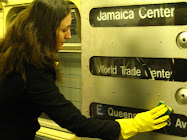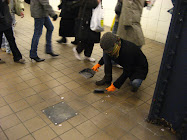Mission Statement
1
Meaning Cleaning is
an ongoing collaborative performance initiated by Hayley Severns and Angela
Rose Voulgarelis. Since 2007 we have cleaned public spaces together as a way to
subvert traditional ideas of what “women’s/domestic work” implies in today’s
society, and to play with notions of acceptable public behavior and social
norms. We’ve done this through the simple intervention of cleaning in public –
an action that is usually done in private.
Dressed in professional
attire and armed with rubber gloves, mops, brooms and eco-friendly cleaning
products, we mop, sweep, and clean areas in an unannounced and unexpected way.
We clean areas of urban centers that are typically used for transportation, and
that are often very dirty: subway stations, sidewalks, train cars, etc. As we
work, we welcome engagement from passersby. Our actions become conversation
starters, as it is highly unusual for two white women dressed in suits to be
cleaning the streets of any urban center.
2
Our performances
take responsibility for our shared urban environment, which is why we feel
strongly that Meaning Cleaning is pertinent to ArteUtil’s mission statement. We
bring to light what we as a community discard and highlight the ethos of human condition.
Our actions provide a fundamentally different approach to the perceived lack of
care for the immediate environment. Our focus as artists is on the foundation
beneath our feet, to be reminded of our interconnection and impermanent nature.
Our work maintains the lineage of Feminist and Conceptual artists before us,
primarily Mierle Laderman Ukeles, Marina Abronovic, and Joseph Beuys.
3
Meaning Cleaning challenges the civic
notions of women’s work and encourages a greater sense of social
responsibility. It also offers an alternative to the product – driven Art
market. When two white women begin cleaning a subway platform, it brings
attention to the action. Why? Is this because one is typically used to seeing
men of color wearing brightly colored jumpsuits cleaning in public? Is taking
care of public space considered a low-level, humiliating job? Or can it be
sublime, a meditation? Our work is an ephemeral action, and only exists in the
time it takes to clean a given area. It is art for the sake of social justice,
and is not made as a commodity.
4
Our
public cleanings are public cleanings: we clean the subway to clean the subway.
We connect a local action with a universal compassion. In light of the
devastation of Hurricane Sandy, and mounting fears of global overpopulation and
climate change, Meaning Cleaning’s message is more important than ever to
today’s society. We feel that one doesn’t need a natural disaster as a reason
to act more humanely towards another human being. Creating a space for this can
occur on any given day.
5
We
work in the real world: in subway stations, on city streets. This non-art
context brings the aspect of social justice and social sculpture to our work.
Our performances remain the same regardless of where they are located. Meaning
Cleaning reflects the functions of the everyday, but is done in public rather
than in private. It is only because both artist initiators happen to live in
New York that Meaning Cleaning has occurred primarily in New York. However,
Meaning Cleaning can be implemented anywhere.
6
Meaning
Cleaning’s strength is in its ability to grow with participation from the
public. It is a facilitated action. Meaning Cleaning is not about us as
individuals, but points to a more inclusive position within society. As such,
we encourage participation from passersby, who have helped us clean, and have
often revealed very intimate aspects about themselves in the process.
7
Meaning
Cleaning calls attention to the way we relate with our environment, and offers
a way to take care of it in a holistic and simple way. Anyone can do it; our
actions merely shine a light on one way to take care of one another by cleaning
the public spaces we all use.
8
Meaning Cleaning’s
work is done with grace and earnestness. We bring the same amount of care to
our public cleanings as we do to every other artistic action we do. We clean
the streets with the same reverence with which we clean our own homes. We take
this project seriously, and understand its transformative potential. We slow
down the action of cleaning in public; we get in the way of people walking by;
we intervene in normal flows of foot traffic so that passersby take notice of
the actions we are doing.
Objectives/goals
One of the
objectives of Meaning Cleaning is to underscore the human element of
interconnection, which tends to get overlooked in everyday life. By changing
the context of an action, such as cleaning in public rather than cleaning in
private, it brings attention to that action. Because our work points to the
care and upkeep of a shared environment, it calls attention to a broader sense
of social responsibility.
A secondary
intention is to offer an alternative to the economically-driven Art world. We
have chosen to work with the immaterial – to draw attention to an action rather
than produce work that can be bought and sold. Once we finish cleaning a given
area, the work gets erased by passersby. It only exists through the
interactions that occur while we are working, and through its documentation.
Our performances go largely unnoticed as they are taking place, and disappear
completely once we stop cleaning.
Beneficial
outcome
The most obvious
benefit is that each space we work in gets very clean! This is done for the
benefit of the community, not just for our own satisfaction. Meaning Cleaning’s
performances are innovative in that we are not the focus of the work; the work is the focus of the work. Our egos are out of the
equation. That, perhaps, is another beneficial outcome.
Additionally, our
work offers an alternative to what art can signify. Our actions provide a
different approach to what art points towards, what the measure of art can be,
and what the role of the artist can be in society. What we are saying is that
art can be accessed by doing anything, even by cleaning the subways in New York
City.
Impact
Meaning Cleaning
has been met with mixed reviews: although we’ve cleaning public areas very
thoroughly, onlookers have had a wide range of reactions – from curiosity to
scathing judgment. We have organized public cleanings that have included a
multitude of volunteers, and have received correspondences from artists and art
groups from different areas of the world who are interested in hosting similar
projects.


